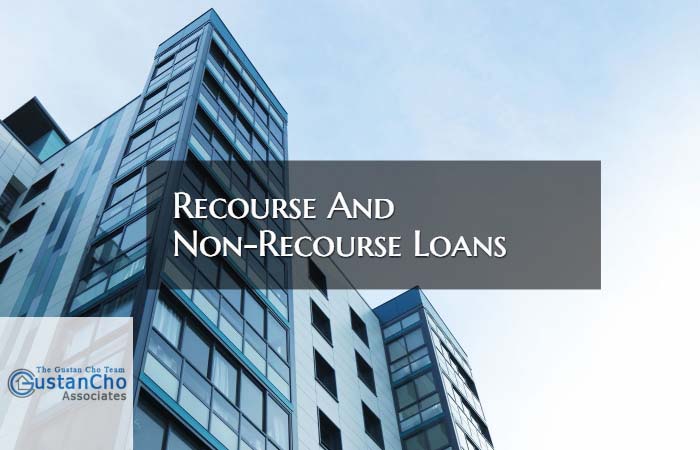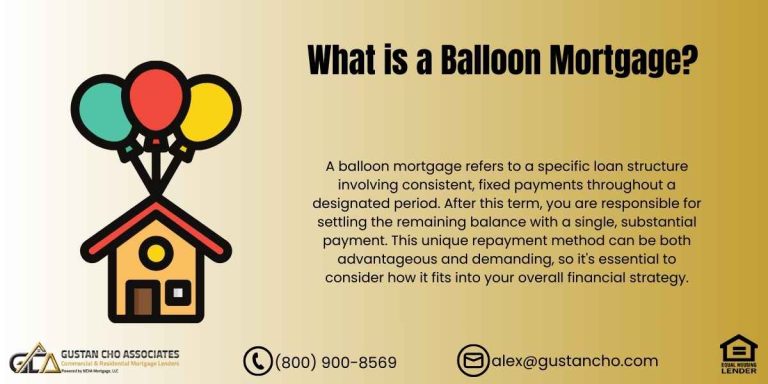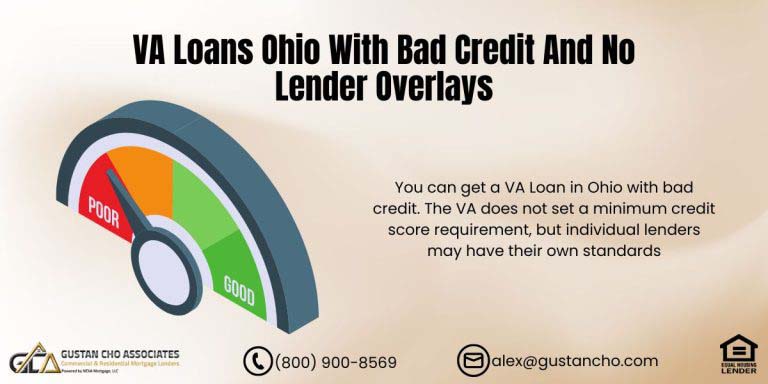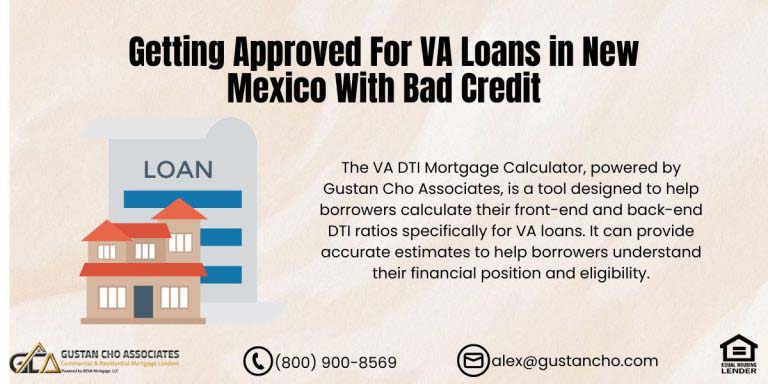This guide cover the differences between recourse and non-recourse loans. The difference between recourse and non-recourse loans are that borrowers are personally liable for recourse loans. With non-recourse loans, borrowers are not personally liable. All primary owner-occupant properties are recourse mortgages. Non-Recourse loans are for investment and commercial loans only. In the following paragraphs, we will cover the differences between recourse and non-recourse loans.
Differences Between The Two Loan Types
Recourse and non-recourse apply for commercial loan programs. With non-recourse loans, the lender is mainly concerned with the property and the cash flow of the property. Dale Elenteny, a senior mortgage loan originator at Gustan Cho Associates explain the differences between recourse and non-recourse loans:
Real Estate Investors that default on a recourse loan, the lender can not only foreclose on a property. They cannot come after the borrower for the shortfall as well as legal fees and other costs associated with the default of commercial mortgage loan.
The property owner normally puts down a large down payment such as a 30% down payment or more. If the property owner goes defaults, the lender will foreclose on the subject property. Lenders will not go after the property owner since it is a non-recourse loan. With recourse, the lender will foreclose on the property in the event of the default. Whatever deficit or shortfall there is, the lender will go after the borrower’s personal assets since it is a recourse loan.
Recourse vs. Non-Recourse Loans: Which One Fits Your Needs?
Understand the differences and choose the right loan type for your financial situation.
Risks With Recourse Mortgages
With recourse loans, the lender can go after the following:
- Can sue borrower
- Go after personal assets
- Garnish wages
- Attempt to sue to freeze asset and bank accounts
- Place liens on other properties and assets
Most commercial investors try to avoid recourse loans and favor non-recourse loans.
Non-Recourse Loans
If you default on a non-recourse loan, the lender can only go after the collateral and you are not liable personally. For example, owner of an apartment building with a non-recourse loan owing lender $500,000 but defaulted on a non-recourse loan. Alex Carlucci, an experienced mortgage loan originator at Gustan Cho Associates explains non-recourse loans:
If the lender takes a $300,000 loss, the lender cannot go after the personal home or other assets even if real estate investor is a millionaire.
The lender takes the loss and they have no other recourse other than the apartment building.
The Difference Between Recourse and Non-Recourse Loans: A Simple Guide
If you want to pick the best loan, knowing the difference between recourse and non-recourse loans pays. Whether you run a business, buy real estate, or are just looking for a personal loan, how these loans work can change your financial plans. This guide breaks down the main differences, pros and cons, and real-world uses of each type so you can make smart, confident choices. We’ve kept it simple and easy to read, focusing on the key points you need to know.
How Do Recourse and Non-Recourse Loans Differ?
Recourse and non-recourse loans differ mainly in how much a lender can pursue a borrower for payment after a default. With a recourse loan, if the borrower can’t repay the loan, the lender can chase after more than just the collateral. For instance, if someone takes a car loan and stops paying, the lender might repossess the car.
Still, if the car’s sale doesn’t cover the loan, the lender can also garnish the borrower’s paycheck or take money from their bank accounts.
Because lenders feel safer knowing they can go after extra assets, they like recourse loans, but borrowers find them riskier. Non-recourse loans, on the other hand, limit the lender to the collateral alone. If a borrower stops paying, the lender can take the house or machinery, but can’t go after other belongings or income. This setup lowers the borrower’s risk but might require better credit, more documentation, and sometimes a higher interest rate.
Benefits of Recourse Loans
Recourse loans can be a smart option for some borrowers. One big plus is the lower interest rates. Since the bank knows it can go after other assets if the borrower can’t repay the loan, lending the money feels safer. This lower cost makes it easier to keep up with the loan long-term. Lenders might also be looser with credit scores or income checks because they feel protected by the extra security of the borrower’s other assets. Borrowers can sometimes negotiate better terms, such as a longer time to pay back the loan or a smaller down payment, which can be helpful when money is tight.
Risks with Recourse Loans
That said, these loans come with serious trade-offs. If the borrower stops paying, the lender can go after personal assets—things like bank accounts, paychecks, or other properties—putting a lot on the line. Defaulting can lead to wage garnishments, liens on other property, and a credit score drop, which makes it harder and costlier to borrow in the future. Knowing that personal assets are at risk can feel heavy, especially when the job market or the economy is shaky. Stretching the budget for the lower rates might save money now, but the fear of losing more later is a big, real pressure.
Advantages of Non-Recourse Loans
Non-recourse loans come with key advantages for savvy borrowers. They cap your financial risk at the collateral, meaning if things don’t work out, your bank account, home, and even your paycheck stay safe. That’s why developers love these loans for risky projects, like commercial buildings, where protecting personal wealth is necessary.
The trade-off between recourse and non-recourse loans? You’ll face a higher interest rate because lenders don’t have many backup plans for getting their money back. They also set stricter gates.
You’ll need a strong credit history, a sizable chunk of collateral, and usually a bigger down payment. Plus, these loans aren’t everywhere. You’ll mainly find them in commercial real estate deals or when a loan is tied directly to a specific piece of equipment or other assets, making them a little tougher to land.
Personal Guarantee on Recourse Loans
Recourse loans, on the other hand, are part of everyday life. You see them in car loans, personal loans, small business loans, and home mortgages. Think of a car loan: if you drive off the lot and the car is worth less than the balance, the lender can come after your other belongings.
The same goes for many small business loans, where the personal guarantee means your assets are on the line. Non-recourse loans usually appear in commercial real estate deals, where the building itself is the only protection for the loan, or in giant projects like bridges and wind farms. They’re also the go-to in asset-based lending, where the loan is based on machinery or unpaid invoices.
Recourse vs. Non-Recourse Loans: What You Need to Know
Get a clear understanding of how these loan types affect your risk and repayment terms.
Recourse and Non-Recourse Loans: Which Loan Is Better For Me
Whether a loan is recourse or non-recourse usually hinges on state laws, especially in the case of mortgages. In states such as California, anti-deficiency rules can stop lenders from going after borrowers for any loan balance remaining after a foreclosure. This effectively turns many California mortgages into non-recourse loans. In states like Florida, however, lenders can usually pursue personal liability for any shortfall unless the loan contract specifically states otherwise. Because the rules vary, it’s a good idea for borrowers to check their state’s laws and to meet with a legal or financial advisor to see how local rules affect the loan’s terms.
Differences Between Recourse and Non-Recourse Loans
Your finances should guide the choice between a recourse loan and a non-recourse loan, how much risk you are willing to take, and your long-term objectives. A recourse loan may be a good fit if you are confident you can make the payments, want a lower interest rate, and prefer lenient qualification standards. This type of loan often works well for personal projects and small businesses. A non-recourse loan, on the other hand, makes more sense for investors looking to buy high-value assets like commercial properties while protecting their assets. Remember that non-recourse loans usually come with tougher credit checks and stricter underwriting, so they are best for larger, riskier projects where shielding personal wealth is a top priority.
Comparing Recourse and Non-Recourse Loans
Before borrowing, research lenders carefully. Compare interest rates, repayment terms, and whether the loan is recourse or non-recourse. Ensure the asset’s value matches the loan amount, especially for non-recourse loans, to avoid borrowing too much. Also, look up your state’s laws on anti-deficiency protections that might limit your liability. Consult a financial advisor or attorney to review the loan agreement and spot any risks. Lastly, a good credit score can help you secure better terms, especially for non-recourse loans.
Changing a Recourse to a Non-Recourse Loan
Many borrowers wonder about specific questions. Changing a recourse loan to a non-recourse loan is uncommon. Still, a lender might agree if the collateral is strong or the borrower has excellent credit. Non-recourse loans are harder since they usually require a higher credit score and a bigger down payment. If you default, the lender can take the asset, but can’t go after your other income or assets. Depending on the state and the loan document, mortgages can be either recourse or non-recourse. Some states automatically protect certain mortgages from recourse, especially those for purchasing the home.
Pros and Cons of Recourse and Non-Recourse Loans
To wrap things up, knowing whether to choose a recourse or non-recourse loan is important for smart money decisions. Recourse loans usually have lower interest rates and are easier to get. Still, they put your assets at risk if you default. Conversely, non-recourse loans shield your assets but have higher costs and tougher approval rules. You can pick the loan that fits you best by considering your money goals, how much risk you can handle, and local laws. For tailored advice, talk to a lender or financial advisor to look at your choices and choose the best path for your financial future.
Got questions about recourse or non-recourse loans? Share your thoughts in the comments or contact a financial expert to review your loan options!
Benefits of Non-Recourse Mortgages
Non-recourse loans are the best way to go for a commercial property investor needing commercial loans. Non-recourse lenders normally have higher mortgage rates. Due to the higher risks, non-recourse lenders require more money down since the subject property is the only collateral they have. John Strange, a senior mortgage loan originator at Gustan Cho Associates explains the benefits of non-recourse mortgages.
There is a limited liability with non-recourse commercial loans. Contact Gustan Cho Associates for more information on commercial recourse and non-recourse loans.
For more information on this blog or other mortgage-related topics, please contact us at Gustan Cho Associates at 800-900-8569 or text us for faster response. Or email us at gcho@gustancho.com. Gustan Cho Associates are lenders with no lender overlays on government and conventional loans. Gustan Cho Associates are also experts in Non-QM Mortgages and bank statement loans for self-employed borrowers. We offer asset depletion mortgages, bank statement loans for self-employed borrowers, fix and flip investment property loans, and Non-QM Jumbo Loans with credit scores down to 500 FICO.
Choosing Between Recourse and Non-Recourse Loans? We Can Help
Understand your options and how they impact your personal liability and risk.








